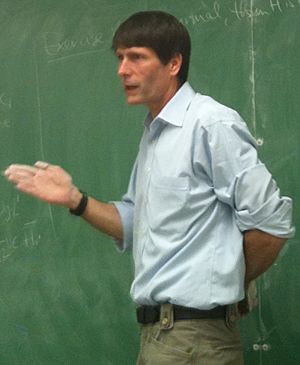Thomas Callister Hales facts for kids
Quick facts for kids
Thomas Hales
|
|
|---|---|
 |
|
| Born | June 4, 1958 |
| Nationality | American |
| Alma mater | Princeton University University of Cambridge Stanford University |
| Known for | Proof of the Kepler conjecture Proof of the honeycomb conjecture Proof of the dodecahedral conjecture |
| Awards |
|
| Scientific career | |
| Fields | Mathematics |
| Institutions | University of Pittsburgh University of Michigan University of Chicago Harvard University |
| Doctoral advisor | Robert Langlands |
| Doctoral students | Julia Gordon |
Thomas Callister Hales, born on June 4, 1958, is an American mathematician. He is well-known for solving some very old and tricky math problems. He works on different areas of math, including how to arrange shapes and how to use computers to check math proofs.
One of his most famous achievements was proving the Kepler conjecture. This puzzle is about the best way to stack spheres, like oranges, so they take up the least amount of space. He also proved the honeycomb conjecture, which explains why honeycombs are shaped the way they are.
Contents
Biography
Early Life and Education
Thomas Hales earned his Ph.D. from Princeton University in 1986. After that, he taught at several famous universities. These included Harvard University and the University of Chicago. From 1993 to 2002, he worked at the University of Michigan. Later, in 2002, he became a professor at the University of Pittsburgh.
Solving the Kepler Conjecture
In 1998, Hales submitted his proof for the Kepler conjecture. This problem had puzzled mathematicians for centuries. It asks: What is the most efficient way to pack spheres? Think about how you might stack oranges in a grocery store. The conjecture says the best way is like a pyramid, or tetrahedron shape.
Hales used computers to help him with this complex proof. He worked with a student named Samuel Ferguson. In 1999, Hales also proved the honeycomb conjecture. This conjecture explains why bees build their honeycombs with hexagonal cells. It's the most efficient way to divide a flat surface into equal areas.
The Flyspeck Project
Because his proof of the Kepler conjecture relied on computer calculations, some mathematicians wanted it to be checked very carefully. So, in 2003, Hales started the Flyspeck Project. The goal was to formally verify his proof using special computer programs called proof assistants. These programs help mathematicians make sure every step of a proof is correct.
The project used two main proof assistants: HOL Light and Isabelle. In 2005, a major math journal, Annals of Mathematics, accepted his proof. However, they were only 99% sure it was completely correct. The Flyspeck team kept working hard. In August 2014, their software finally confirmed that the proof was indeed correct. This was a huge step for using computers in math.
Formal Abstracts Project
In 2017, Thomas Hales started another interesting project called Formal Abstracts. This project aims to make it easier to check math research papers. It tries to write the main ideas of each paper in a computer language. This way, computers can help mathematicians be more precise. It also helps different math ideas connect better. In the future, this project hopes to use artificial intelligence to help with math proofs.
Awards and Recognition
Thomas Hales has received many important awards for his work. In 2002, he was invited to speak at the International Congress of Mathematicians. This is a very big event for mathematicians worldwide.
He won the Chauvenet Prize in 2003. This award is given for excellent math writing. In 2007, he received the first-ever David P. Robbins Prize from the American Mathematical Society. He also won the Fulkerson Prize in 2009 for his work in discrete mathematics.
In 2012, he became a fellow of the American Mathematical Society. This means he is recognized as a leading mathematician. In 2019, he gave the Tarski Lectures, which are a series of important talks in logic. In 2020, he was awarded the Senior Berwick Prize by the London Mathematical Society.
See also
 In Spanish: Thomas Callister Hales para niños
In Spanish: Thomas Callister Hales para niños

